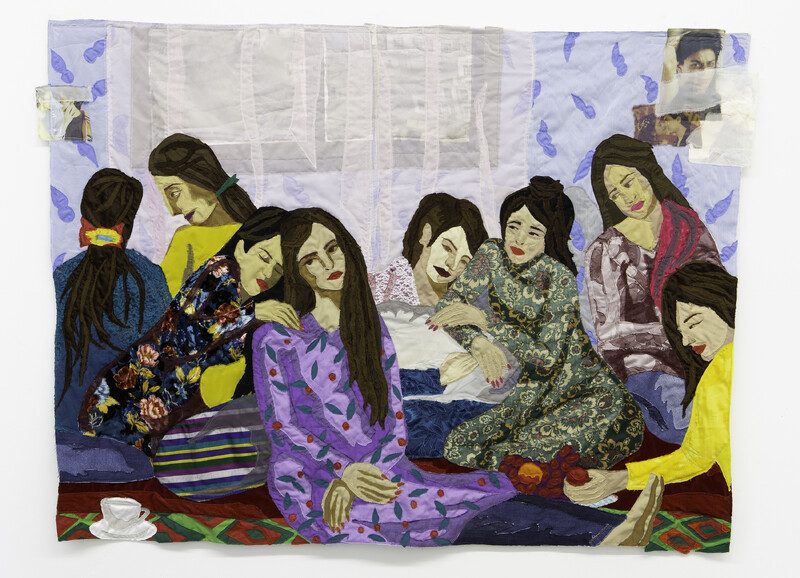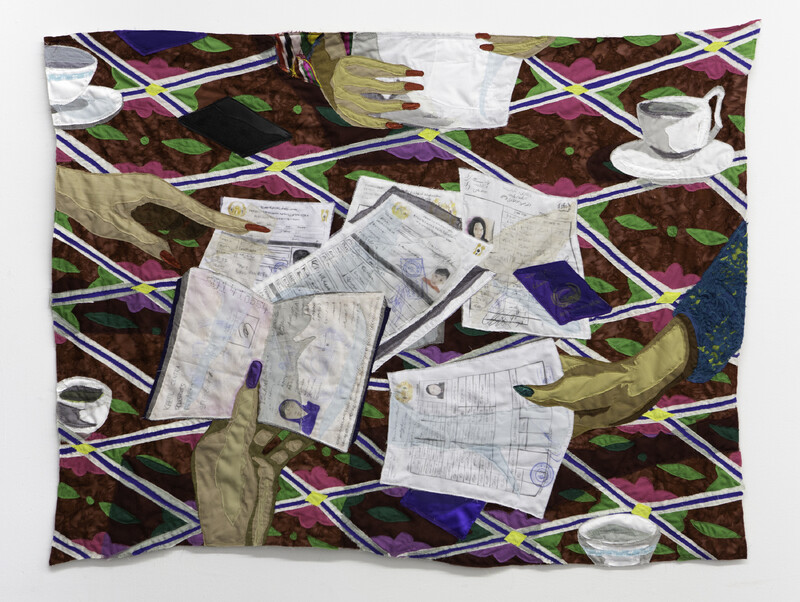- 12.0Cover
- 12.1Seams of ResilienceHangama Amiri
- 12.2How to Read this Broadsheet
- 12.3In Errors We See OurselvesTheodore (ted) Kerr
- 12.4The Pain that Bonds UsRula Kahil, Laila Omar, Neda Maghbouleh
- 12.5Undocumented: The Architecture of Migrant DetentionTings Chak
- 12.6carverCecily Nicholson
- 12.7"Holding the Door Open for Change"Tehmina Ahmad, Kori Doty, Gabrielle Griffith, A.J. Lowik, Nat Raha
- 12.8Epistolary LifelinesMercedes Eng, Kriss Li
- 12.9Palestinian Children: Art Therapy and Intergenerational TraumaRehab Nazzal
- 12.10Diasporic DumplingsAmanda Huynh
- 12.11Solidarity as a Force
Karie Liao
- 12.12Weaving to Reclaim the Bonds of Culture and LandNadia Kurd
- 12.13Glossary
Seams of Resilience
- Hangama Amiri

A woman leans back into the embrace of another, who kneels nearby on the floor. Buttressed in a seated position by the clasped hand and tilted head of her nurturing companion, the first woman stares wistfully forward with her hands crossed gently on her lap. They are surrounded by six others, also nestled on the ground in contemplative postures, mutually supporting one another. In a room with blue ornamented wallpaper, cut-out photographs, and two windows with drawn blinds and diaphanous pink drapes, the women wear colourful and floral-patterned dresses, gathering to share a cup of tea. Rendered in fabric and stitched together by Afghan-Canadian artist Hangama Amiri, the image—a large-scale textile work entitled Eight Seated Women—captures an intimate moment of solidarity, reflecting the community bonds and unfaltering kinship of a group of women living in Afghanistan.
Eight Seated Women exemplifies Amiri’s ongoing engagement with textiles to explore personal and collective experiences of repression, migration, and diaspora as an Afghan woman and former refugee. The fabrics of sarees, kurtas, and kameezes she employs recall memories of her childhood in Central Asia before immigrating to Canada at sixteen. Concepts of home, connectivity, and resiliency are threaded throughout her work, confronting the alienating effects of geopolitical unrest, and the Taliban’s subjugation of marginalized individuals in Afghanistan, particularly women.
Now living in Connecticut, Amiri draws on exchanges with relatives and friends in Kabul to probe how women’s lives continue to be relegated by oppressive governance, including their ownership of Tazkira—the national identity document that facilitates access to basic services—as explored in Still-Life with Papers (below). Through her textile works, Amiri reveals the indelible connections cultivated by women, reinforcing the seams for resistance against inequality amid political upheaval.

See Connections ⤴